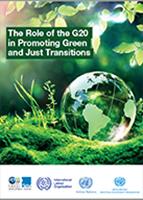
A green and just transition – i.e. concerted global and national efforts to achieve worldwide carbon neutrality by or around the mid-century globally, in an inclusive manner and adapted to each national context – requires an active co-operation of all countries, developed and developing.
It also entails ensuring that no one is left behind, and offering support to those in need, including least developed countries (LDCs) and Small Island Developing States (SIDS).
Guided by the preamble of the Paris Agreement, this report proposes ways for G20 and developing countries to enhance the coherence of their policies towards that vision, deepen their co-operation and render the international architecture better suited to the implementation of green and just transitions.
The report begins by exploring the purpose of green and just transitions as the world community moves towards sustainable development.
The first chapter stresses the importance of understanding the objective, challenges and opportunities of green and just transitions and of ensuring policy coherence within and among governments and all relevant actors, across all population groups, sectors, territories, generations and genders.
It provides an overview of the evolution of the objectives of "just transitions", its utilisation in international forums and the intricacies of its components.
The chapter considers the importance of understanding not only the challenges but also the opportunities presented by green and just transitions, focusing on the impacts of both climate change and climate-change policies.
The second chapter seeks to identify the opportunities and synergies involved in taking an integrated and co-ordinated approach to the green and just transitions.
It stresses the importance of adopting a systemic approach in order to achieve policy coherence, at national and international levels, and considers what this implies for developing countries.
The chapter proposes ways of promoting inclusive, sustainable and job-rich economies, and ensuring social equity.
This involves redesigning policies on energy, industry, trade, agriculture and infrastructure, and creating new formal jobs and green skills.
The chapter notes that the process of promoting green and just transitions can be managed and financed by building societal support and by strengthening co-ordination among institutions.
It stresses the importance for green and just transitions of enhancing international policy coherence, co-operation, co-ordination and solidarity.
The third and final chapter of the report offers policy recommendations for the G20 and developing countries.
A first set of recommendations focuses on how the G20 can advance green and just transitions coherently. A second set focuses on promoting green and just transitions through multilateral instruments.


